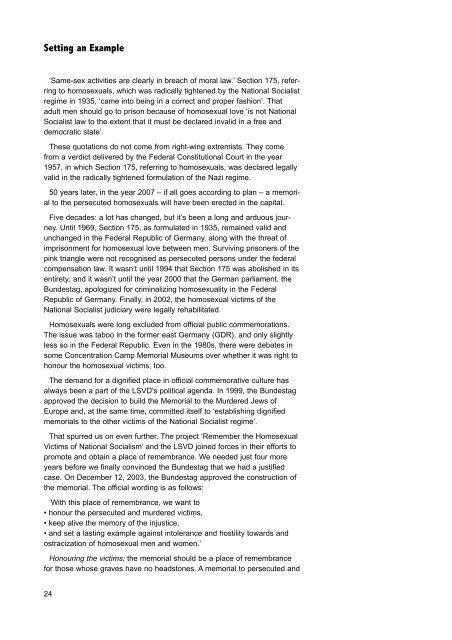Download PDF - Gedenkort für die im Nationalsozialismus ...
Download PDF - Gedenkort für die im Nationalsozialismus ...
Download PDF - Gedenkort für die im Nationalsozialismus ...
Sie wollen auch ein ePaper? Erhöhen Sie die Reichweite Ihrer Titel.
YUMPU macht aus Druck-PDFs automatisch weboptimierte ePaper, die Google liebt.
Setting an Example‘Same-sex activities are clearly in breach of moral law.’ Section 175, referringto homosexuals, which was radically tightened by the National Socialistreg<strong>im</strong>e in 1935, ‘came into being in a correct and proper fashion’. Thatadult men should go to prison because of homosexual love ‘is not NationalSocialist law to the extent that it must be declared invalid in a free anddemocratic state’.These quotations do not come from right-wing extremists. They comefrom a verdict delivered by the Federal Constitutional Court in the year1957, in which Section 175, referring to homosexuals, was declared legallyvalid in the radically tightened formulation of the Nazi reg<strong>im</strong>e.50 years later, in the year 2007 – if all goes according to plan – a memorialto the persecuted homosexuals will have been erected in the capital.Five decades: a lot has changed, but it’s been a long and arduous journey.Until 1969, Section 175, as formulated in 1935, remained valid andunchanged in the Federal Republic of Germany, along with the threat of<strong>im</strong>prisonment for homosexual love between men. Surviving prisoners of thepink triangle were not recognised as persecuted persons under the federalcompensation law. It wasn’t until 1994 that Section 175 was abolished in itsentirety; and it wasn’t until the year 2000 that the German parliament, theBundestag, apologized for cr<strong>im</strong>inalizing homosexuality in the FederalRepublic of Germany. Finally, in 2002, the homosexual vict<strong>im</strong>s of theNational Socialist judiciary were legally rehabilitated.Homosexuals were long excluded from official public commemorations.The issue was taboo in the former east Germany (GDR), and only slightlyless so in the Federal Republic. Even in the 1980s, there were debates insome Concentration Camp Memorial Museums over whether it was right tohonour the homosexual vict<strong>im</strong>s, too.The demand for a dignified place in official commemorative culture hasalways been a part of the LSVD’s political agenda. In 1999, the Bundestagapproved the decision to build the Memorial to the Murdered Jews ofEurope and, at the same t<strong>im</strong>e, committed itself to ‘establishing dignifiedmemorials to the other vict<strong>im</strong>s of the National Socialist reg<strong>im</strong>e’.That spurred us on even further. The project ‘Remember the HomosexualVict<strong>im</strong>s of National Socialism’ and the LSVD joined forces in their efforts topromote and obtain a place of remembrance. We needed just four moreyears before we finally convinced the Bundestag that we had a justifiedcase. On December 12, 2003, the Bundestag approved the construction ofthe memorial. The official wording is as follows:‘With this place of remembrance, we want to• honour the persecuted and murdered vict<strong>im</strong>s,• keep alive the memory of the injustice,• and set a lasting example against intolerance and hostility towards andostracization of homosexual men and women.’Honouring the vict<strong>im</strong>s: the memorial should be a place of remembrancefor those whose graves have no headstones. A memorial to persecuted and24


